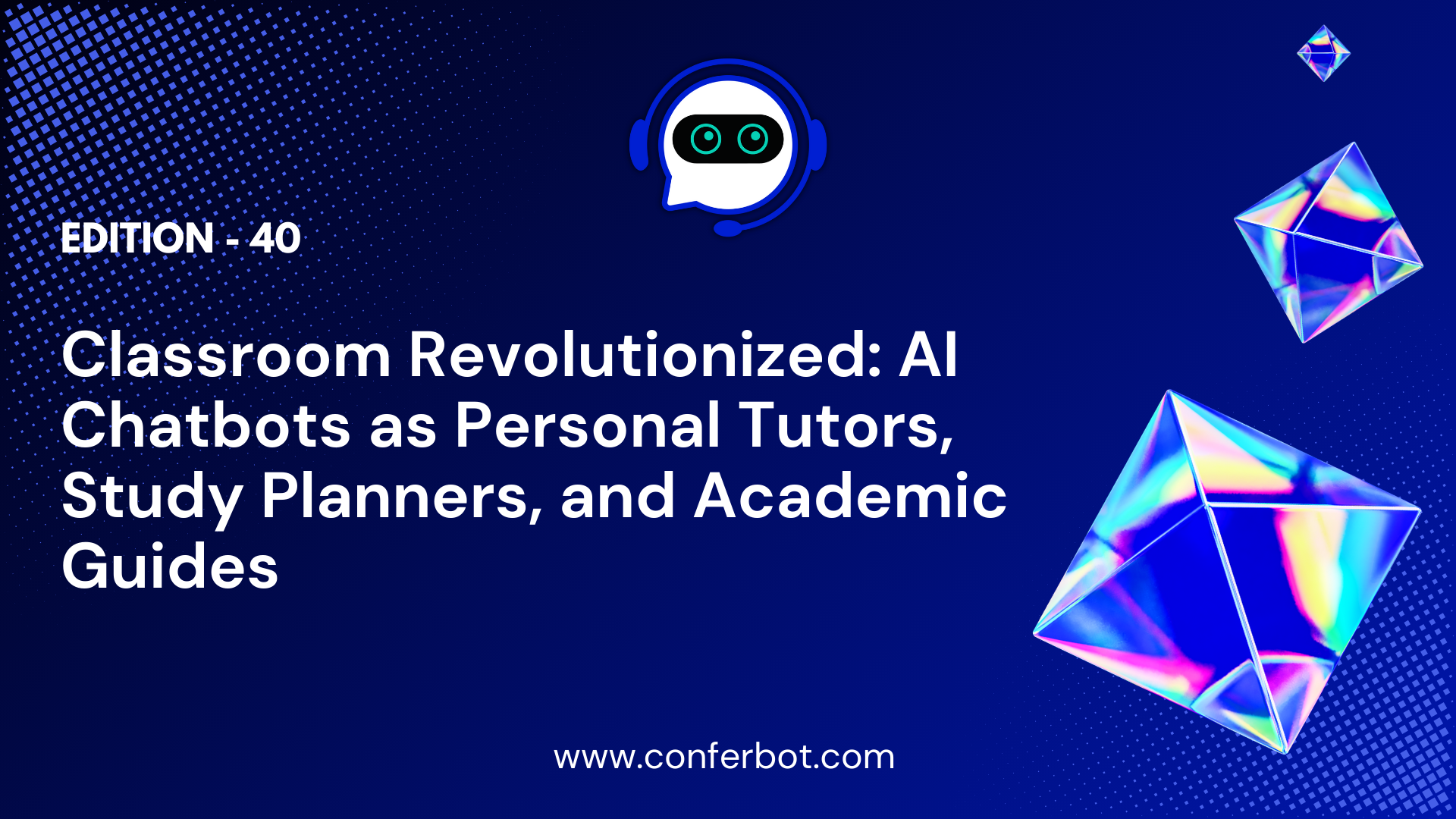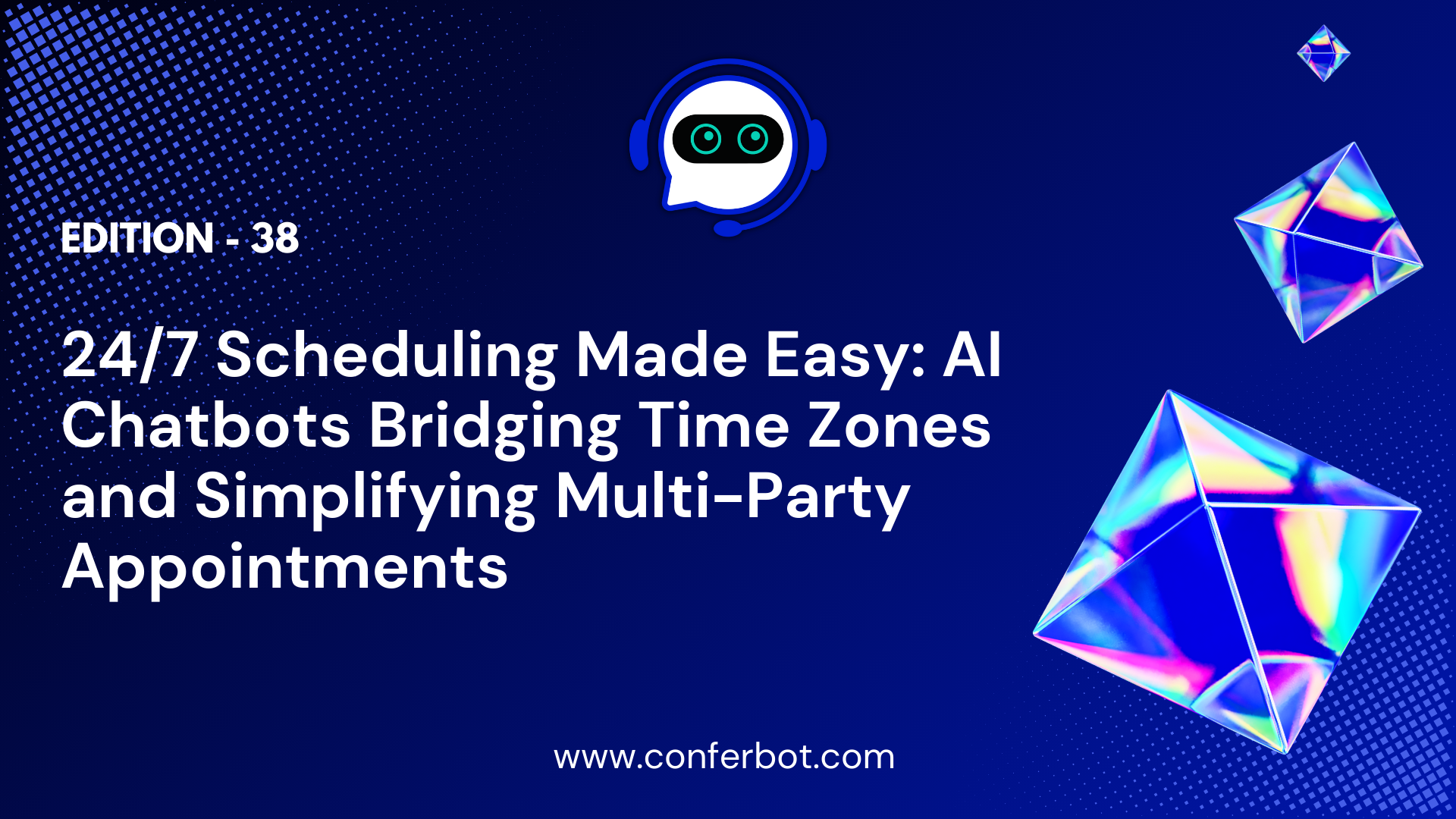
The Role of AI Chatbots in Promoting Mental Health and Well-being: Accessible Support and Personalized Interventions
Discover how AI chatbots are transforming mental health care, providing accessible support, personalized interventions, and enhancing traditional therapy in our latest Insights on Chatbots & AI edition.

Welcome to the eighteenth edition of Insights on Chatbots & AI, where we explore the transformative potential of AI chatbots in promoting mental health and well-being. This issue delves into how these intelligent systems are making mental health support more accessible, providing personalized interventions, and revolutionizing the way we approach mental health care. Discover how AI chatbots are breaking down barriers and empowering individuals to prioritize their mental well-being. One of the most significant challenges in mental health care is accessibility. Many individuals who struggle with mental health issues face barriers to seeking help, such as stigma, cost, and limited availability of mental health professionals. AI chatbots are emerging as a powerful tool to bridge this gap, providing immediate, confidential, and low-cost support to those in need. Mental health chatbots are available 24/7, allowing individuals to access support whenever they need it, without the constraints of traditional office hours or waiting lists. This round-the-clock availability is particularly crucial for individuals experiencing crisis situations or those who may not have the flexibility to schedule appointments during regular business hours. Moreover, AI chatbots offer a level of anonymity that can be particularly appealing to those who may feel hesitant to seek help due to stigma or privacy concerns. By providing a safe and non-judgmental space for individuals to express their thoughts and feelings, chatbots can help break down the barriers that prevent many from seeking support. The accessibility of mental health chatbots extends beyond their 24/7 availability and anonymity. These intelligent systems can also be accessed from anywhere with an internet connection, making them particularly valuable for individuals in remote or underserved areas where mental health resources may be scarce. AI chatbots can also help bridge language barriers, offering support in multiple languages and ensuring that mental health resources are accessible to diverse populations. This multilingual capability is essential for providing equitable access to mental health support and promoting inclusivity in mental health care. Furthermore, mental health chatbots can serve as a first line of defense, helping individuals identify potential mental health concerns and guiding them towards appropriate resources and professional help when needed. By providing psychoeducation, self-assessment tools, and referral services, chatbots can help individuals better understand their mental health and take proactive steps towards seeking support. In addition to making mental health support more accessible, AI chatbots are also revolutionizing the way we approach mental health interventions. By leveraging advanced natural language processing and machine learning algorithms, these intelligent systems can provide highly personalized and tailored support to individuals based on their unique needs and circumstances. Mental health chatbots can engage in natural, empathetic conversations with users, asking questions and gathering information about their thoughts, feelings, and experiences. This conversational approach allows chatbots to build rapport with users and create a sense of trust and understanding, which is essential for effective mental health support. Based on the information gathered through these conversations, AI chatbots can provide personalized recommendations and interventions that are tailored to each individual's specific mental health concerns and goals. For example, a chatbot may suggest specific coping strategies, relaxation techniques, or mindfulness exercises based on a user's reported symptoms of anxiety or stress. Personalized interventions can also include providing targeted psychoeducational content, such as articles, videos, or podcasts, that are relevant to an individual's specific mental health needs. By curating and delivering this content in a conversational and engaging way, chatbots can help individuals gain a deeper understanding of their mental health and develop practical skills for managing their well-being. Moreover, AI chatbots can adapt their communication style and tone to match each individual's preferences and needs. For example, some users may prefer a more direct and solutions-focused approach, while others may benefit from a more empathetic and supportive communication style. By personalizing their interactions in this way, chatbots can create a more engaging and effective experience for each user. The personalization capabilities of mental health chatbots extend beyond one-time interventions. These intelligent systems can also provide ongoing support and check-ins, helping individuals track their progress and adjust their coping strategies over time. By maintaining a consistent and supportive presence, chatbots can help individuals stay motivated and engaged in their mental health journey. While AI chatbots offer numerous benefits as standalone tools for mental health support, they also have the potential to enhance and complement traditional mental health care. By integrating chatbots into existing mental health services, providers can offer a more comprehensive and efficient approach to care. One way in which mental health chatbots can enhance traditional care is by serving as a bridge between therapy sessions. Chatbots can provide ongoing support and reinforcement of coping strategies learned in therapy, helping individuals practice and integrate these skills into their daily lives. This continuity of care can help maximize the benefits of therapy and promote long-term mental health outcomes. AI chatbots can also assist mental health professionals by gathering important data and insights about their clients' mental health status and progress. By tracking mood patterns, sleep quality, and other relevant metrics, chatbots can provide therapists with valuable information to inform treatment plans and interventions. This data-driven approach can help mental health professionals make more informed decisions and tailor their care to each individual's unique needs. Moreover, mental health chatbots can help alleviate some of the burden on mental health professionals by handling routine tasks and triaging cases based on severity. By automating initial assessments, scheduling, and other administrative tasks, chatbots can free up valuable time for mental health professionals to focus on providing high-quality, individualized care to their clients. It is important to note that while AI chatbots offer numerous benefits, they are not intended to replace human mental health professionals. Rather, they should be viewed as a complementary tool that can enhance and extend the reach of traditional mental health services. The most effective mental health care will likely involve a combination of human and AI support, leveraging the strengths of both to provide comprehensive, accessible, and personalized care. Conferbot is at the forefront of developing AI chatbot solutions for mental health and well-being. Their cutting-edge chatbots are designed to provide accessible, personalized, and evidence-based support to individuals seeking to improve their mental health. One of Conferbot's flagship offerings is their "MindBot" platform, which provides a comprehensive suite of AI-powered tools for mental health support. MindBot chatbots are trained on vast datasets of mental health information and best practices, enabling them to provide accurate, up-to-date, and evidence-based support to users. MindBot chatbots offer a wide range of features and capabilities, including: 1. Personalized mental health assessments and symptom tracking 2. Evidence-based coping strategies and interventions 3. Mindfulness and relaxation exercises 4. Psychoeducational content and resources 5. Crisis support and referral services Conferbot's MindBot chatbots are designed with accessibility and inclusivity in mind. They offer multilingual support, 24/7 availability, and the ability to access support from any device with an internet connection. This ensures that mental health support is available to anyone, anywhere, at any time. In addition to their direct-to-consumer offerings, Conferbot also partners with mental health providers, employee assistance programs, and educational institutions to integrate their AI chatbot solutions into existing mental health services. By providing a seamless and efficient way to extend the reach of traditional mental health care, Conferbot is helping to create a more comprehensive and effective mental health ecosystem. This edition of Insights on Chatbots & AI highlights the transformative potential of AI chatbots in promoting mental health and well-being. By making mental health support more accessible, providing personalized interventions, and enhancing traditional mental health care, these intelligent systems are reshaping the landscape of mental health care. As we continue to grapple with the global mental health crisis, AI chatbots offer a promising solution for expanding access to support and empowering individuals to prioritize their mental well-being. By leveraging the power of artificial intelligence and machine learning, we can create a more responsive, efficient, and effective mental health care system that meets the diverse needs of individuals worldwide. However, it is crucial to approach the development and deployment of mental health chatbots with care and consideration. These systems must be designed with strong ethical principles in mind, ensuring that they prioritize the safety, privacy, and well-being of users above all else. It is also essential to recognize the limitations of AI chatbots and to ensure that they are used as a complement to, rather than a replacement for, human mental health professionals. As we move forward, the potential for AI chatbots to transform mental health care is immense. By continuing to invest in research, development, and responsible deployment of these technologies, we can create a future in which accessible, personalized, and effective mental health support is available to all who need it. At Conferbot, we are committed to being at the forefront of this transformation, pioneering innovative solutions that harness the power of AI to promote mental health and well-being for all.Introduction
Making Mental Health Support Accessible
Providing Personalized Interventions
Enhancing Traditional Mental Health Care
Spotlight on Conferbot: Pioneering AI-Driven Mental Health Solutions
Conclusion
Tags :
personalized communication customer engagement lead generation no code chatbot platform digital marketing strategy business automation free chatbot builder conferbot innovation ask email node interactive chatbots tech tutorial user engagement chatbot personalization digital marketing customer interaction no-code chatbot
The Conferbot Team
About AuthorHi there! I'm Conferbot, a simple and powerful tool that enables you to create chatbots for your website in minutes.
Try me out and see how I can help make your work life easier, just like I have for 10k+ satisfied users worldwide.


